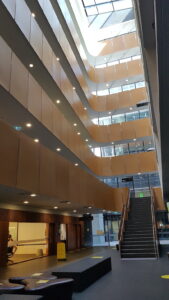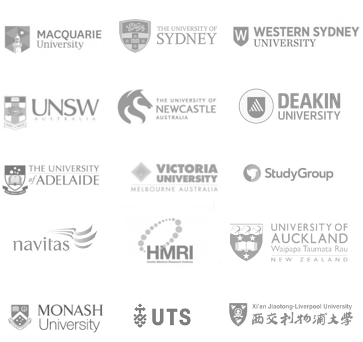Congratulations to Professor Jake Baum
Congratulations and welcome to Professor Jake Baum! Professor Baum will begin his role as the new Head of the School of Medical Sciences at UNSW Medicine and Health in January 2022. He is respected as an innovative academic leader, with a commitment to education & broader social engagement.
Professor Baum is currently the Co-Director of the Institute of Infection and a Professor of Cell Biology and Infectious Diseases at Imperial College London, UK.
The move represents a return to Australia for the British academic. After completing his Bachelors and Masters degrees at Oxford University, Professor Baum received his PhD from the London School of Hygiene and Tropical Medicine in 2002. In 2003, he moved to the Walter and Eliza Hall Institute in Melbourne, Australia to work on the fundamentals of malaria parasite molecular and cellular biology. During this postdoctoral tenure under the mentorship of Professor Alan Cowman, Baum worked on several projects relating to parasite invasion of the red blood cell, work that included the discovery of PfRH5, currently the lead-of-field developmental blood-stage malaria vaccine to which he is a named inventor. Following a visiting fellowship at Yale University in the pioneering lab of Thomas Pollard, a global leader in cytoskeletal biology, Baum established his own independent lab at the Hall Institute in 2010, applying super resolution and electron microscopy to the study of parasite invasion and cytoskeletal processes. In 2013, returned to the UK, joining Imperial College. In 2017, Baum was promoted to Professor of Cell Biology and Infectious Diseases in recognition of efforts at the cutting edge of malaria science, teaching and leadership at Imperial College. Professor Baum’s laboratory has a diverse research portfolio including major programmes in drug discovery, funded by the Medicines for Malaria Venture and Bill and Melinda Gates Foundation, programmes at the interface between biophysics (fundamental science), engineering (digital diagnostics for malaria) and cell biology, funded through the Human Frontier Science Program, Wellcome and the EPSRC and major links with industry (GSK) and field work (MRC-Newton funded collaborative work with Mahidol University) on anti-malarial drug resistance. In addition to running his interdisciplinary lab and coordinating cell biology courses for undergraduates, Jake was appointed as inaugural co-Director of Imperial College Institute of Infection, a new Institute charged with representing the entire interdisciplinary research portfolio of infection research at Imperial and championing inter-disciplinary research between the University’s four faculties. Jake has published >100 papers and holds 3 patents translating research for malaria intervention. He is a former recipient of a Victorian Tall Poppy Award, the Merck Millipore Medal from the ASBMB, the Burnet Prize from the WEHI and a Fellow of the Royal Society of Biology, UK.
About the appointment

Students in study area of Wallace Wurth Building
The Head of School of Medical Sciences (HoS) is a senior academic leadership role within UNSW Medicine and Health, with overall responsibility for the strategic and operational leadership of the School of Medical Sciences. The HoS supports the Faculty’s Dean through the provision of creative leadership in the development and implementation of innovative educational offerings and research programs within the School and across the Faculty, the effective alignment and integration of the School’s teaching and research across the broader Faculty and its partners, as well as the effective management of teaching and research quality and impact within the School aligned to the Faculty’s Health 25 Strategy and UNSW’s strategic objectives
The HoS will be able to develop new programs to address community and industry needs and to enhance opportunities for graduates.
About UNSW
UNSW is a world top 50 medical faculty with a vision to modernise medicine. Under the leadership of Professor Vlado Perkovic, the UNSW Medicine & Health25 Strategy positions health precincts as key elements to building impact in ways that are dynamic and progressive. Within this broader biomedical ecosystem, the School of Medical Sciences is one the University’s largest and is the leading teaching-focused School within UNSW Medicine & Health.
The School is part of campus that has had a large investment in redevelopment of research and teaching spaces, and is adjacent to the broader health precinct of hospitals and medical research institutes. The School occupies the Wallace Wurth (Medicine) building at UNSW and is physically linked to both the Lowy Cancer Research Centre and the Biological Sciences Building. Core research facilities exist within this Biomedical Science precinct to fully support virtually all contemporary forms of biomedical research. 



